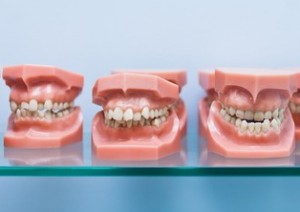Treatment Options for Overbites, Underbites & Crossbites
If your teeth align abnormally and you have difficulty chewing, you might have a bad bite. Also known as malocclusions, bad bites come in several forms. Three of the most common include overbites, underbites, and crossbites. Learn more about these misaligned bites and the treatment options available.
 Crossbites
Crossbites
Look at the left jaw in the image to the right to see an example of a severe crossbite. This type of malocclusion can involve a single tooth or several teeth. It’s characterized by any upper tooth ending up on the inside of the bite, or any lower tooth protruding to the outside of the bite. Crossbites usually occur when the upper jaw is too narrow. Common problems with this malocclusion include excessive wear, gum disease, and bone loss.
Overbites
The center jaw in the image shows an overbite. This refers to a vertical overlap of the upper front teeth over the lower teeth. Both shallow and deep overbites can cause various oral health problems.
Underbites
The final jaw in the image illustrates an underbite, which is when the lower front teeth protrude past the upper front teeth. An underdeveloped upper jaw, overgrown lower jaw, or both can cause this malocclusion. Excessive tooth wear and pain in the jaw joints are common.
Why Misaligned Bites are Problematic
Most people have at least some degree of malocclusion, but mild cases aren’t a cause for concern. However, if you or your child has a serious bite problem, it could:
- Interfere with proper chewing: When the biting surfaces of your teeth don’t contact properly, it could make chewing difficult or even painful.
- Increase the risk of tooth decay and gum disease: Teeth in a misaligned bite are often crooked and crowded. This makes it difficult to properly clean your teeth, increasing the chance of decay and the cavities and gum disease that go with it.
- Strain the teeth, jaw, and muscles: You may experience headaches, sore jaw muscles, or even toothaches if your jaw doesn’t align properly.
- Increase the risk of breaking a tooth: Malocclusions cause your teeth to contact in unusual places. Playing sports or even just roughhousing greatly increases the possibility of breaking a tooth or biting your tongue.
- Create self-confidence issues: Gaps between your upper and lower jaw could cause speech impediments, making you self-conscious. A protruding jaw from an underbite or “weak” chin resulting from an overbite could also make you insecure about your appearance.
Treatment Options for Misaligned Bites
If you experience any of the above problems, you have several options for treating your misaligned bite. Some of the most common include:
- Removable retainer: For minor bite problems, a retainer may be all you need to stabilize a new position for your teeth.
- Braces: Most often, braces are needed to correct malocclusions.
- Tooth extraction: If overcrowding is the main reason for your misaligned bite, you might need one or more teeth extracted. This can be done before wearing braces to make room for your remaining teeth to align properly.
- Surgery: For extreme overbites and underbites, jaw surgery may be necessary. You’ll probably have to wait until adulthood when your jaw has finished growing to have this corrective operation.
Treat Your Bite Problems at Evanson DDS
If you’re concerned about your own or your child’s bite pattern, visit Evanson DDS in Parker for a consultation. We can take X-rays, photographs of your face, and teeth impressions to determine the extent of your malocclusion. Depending on your condition, we can either treat you in our office or refer you to a specialist in the Denver area.
Don’t let your overbite, underbite, or crossbite go untreated! Call (720) 409-0008 to schedule a consultation with Dr. Evanson today.
Leave a reply →





